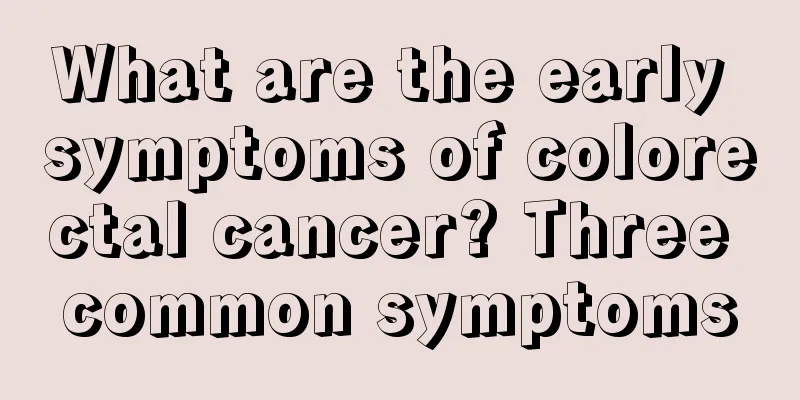What are the early symptoms of colorectal cancer? Three common symptoms

|
Early symptoms of colorectal cancer include changes in bowel habits, blood in the stool, and unexplained abdominal pain. If you find these symptoms, you should seek medical attention immediately. By identifying these symptoms early, you can detect the disease early and avoid delaying treatment. 1) Changes in bowel habits In the early stages of colorectal cancer, there may be changes in bowel movement frequency, such as alternating diarrhea and constipation, or irregular bowel movements. Some patients may feel that their bowel movements are not complete or that they have a feeling of intestinal obstruction. This is because tumor growth may cause the intestinal passage to narrow, thus affecting normal bowel movement. If there is persistent bowel abnormality and it cannot be explained by other reasons, it is recommended to see a doctor as soon as possible and undergo a colonoscopy. 2) Blood in stool or abnormal stool color Blood in the stool or abnormally dark color (such as black stool) is one of the more common early symptoms of colorectal cancer. Blood in the stool may be caused by damage to the intestinal mucosa caused by the tumor, but it should be noted that blood in the stool may also be related to other diseases such as hemorrhoids, and the cause should be further clarified through examination in time. It is recommended that patients first undergo a fecal occult blood test after discovering blood in the stool, and then diagnose through colonoscopy and other means. 3) Unexplained abdominal pain or bloating Tumors may affect the normal peristalsis of the intestines, causing intestinal stenosis or even partial obstruction, which can lead to abdominal pain or bloating. This pain is usually mild and intermittent, but may become more frequent and severe as the condition worsens. If the abdominal pain is not obviously related to eating, lasts for a long time or is accompanied by other symptoms, you should be highly alert to the possibility of colorectal cancer. Early symptoms of colorectal cancer can be easily confused with other digestive tract diseases. Therefore, if you notice changes in bowel habits, blood in the stool, or unexplained abdominal pain, you should seek medical attention and undergo screening as soon as possible. Paying attention to a healthy lifestyle, such as consuming more dietary fiber, exercising regularly, quitting smoking and drinking, can also reduce the risk of colorectal cancer. Early detection, diagnosis, and treatment are the key to controlling the progression of colorectal cancer and improving the cure rate. |
<<: Can prostate cysts be cancer?
>>: Early symptoms of brain glioma in children
Recommend
Prostate cancer family prevention and treatment manual Introduction to prostate cancer prevention methods
Prostate cancer family prevention and treatment m...
Survival rate of bronchial lung cancer
What is the survival rate of bronchial lung cance...
Humerus fracture healing time and treatment methods
We all know that humeral injuries have a great im...
Will eating coix seed increase blood pressure?
Hypertension has now become a very common disease...
Tips for new leather shoes rubbing your feet on the heels
Many people like to wear new shoes, because new s...
What are the causes of liver cancer? Eat these to beware of liver cancer
Stale oils contain a chemical component that can ...
Is acne after moxibustion a detoxification?
Many people will experience many post-moxibustion...
Foods that people with thyroid cancer should avoid for life
Thyroid cancer patients need to avoid certain foo...
The main cause of melanoma
Melanoma is a very common disease in life, but mo...
What is the method to make homemade dried rose toner?
Rose is one of the most popular flowers. Not only...
Why does abdominal bloating occur
I believe that abdominal bloating is something th...
Why do my calf muscles ache after drinking?
Some people always feel soreness in their calf mu...
What is the humerus
The humerus is the thickest bone in our upper lim...
My hair is sticky after washing
Hair health is very important because the hair on...
What are the benefits of drinking your own urine
Drinking your own urine generally does not provid...









